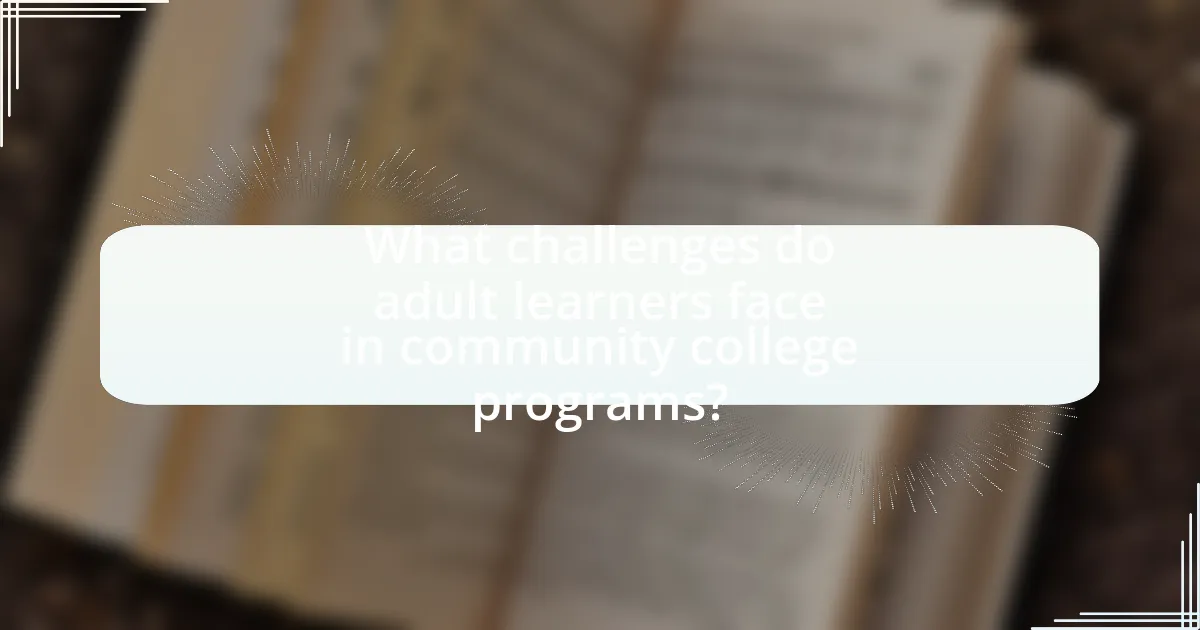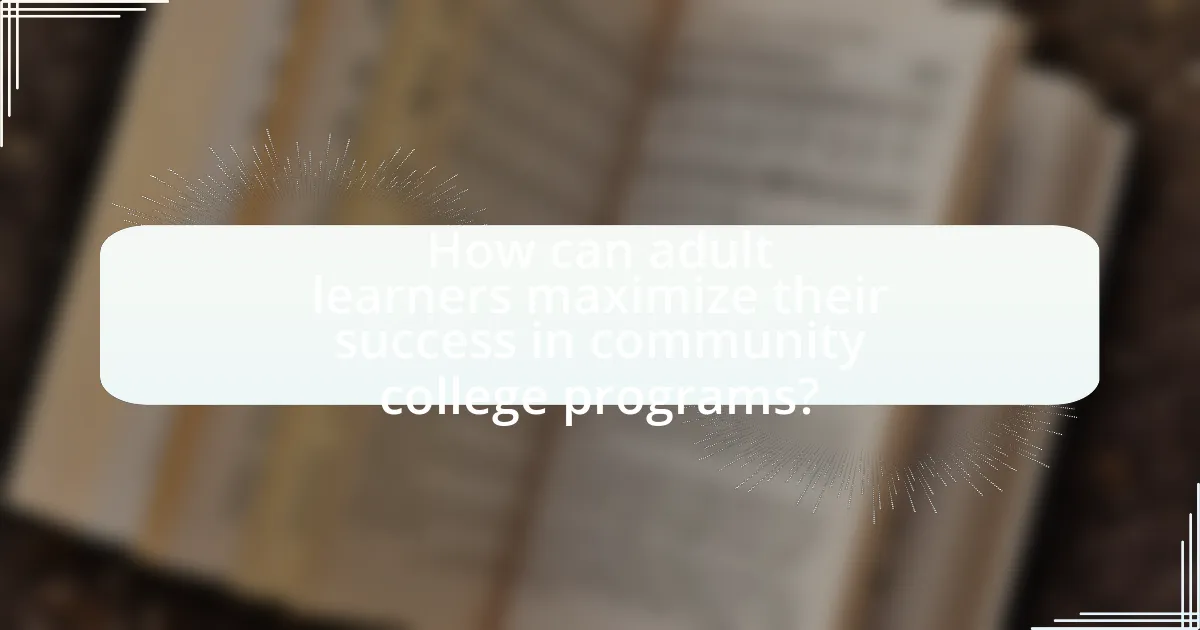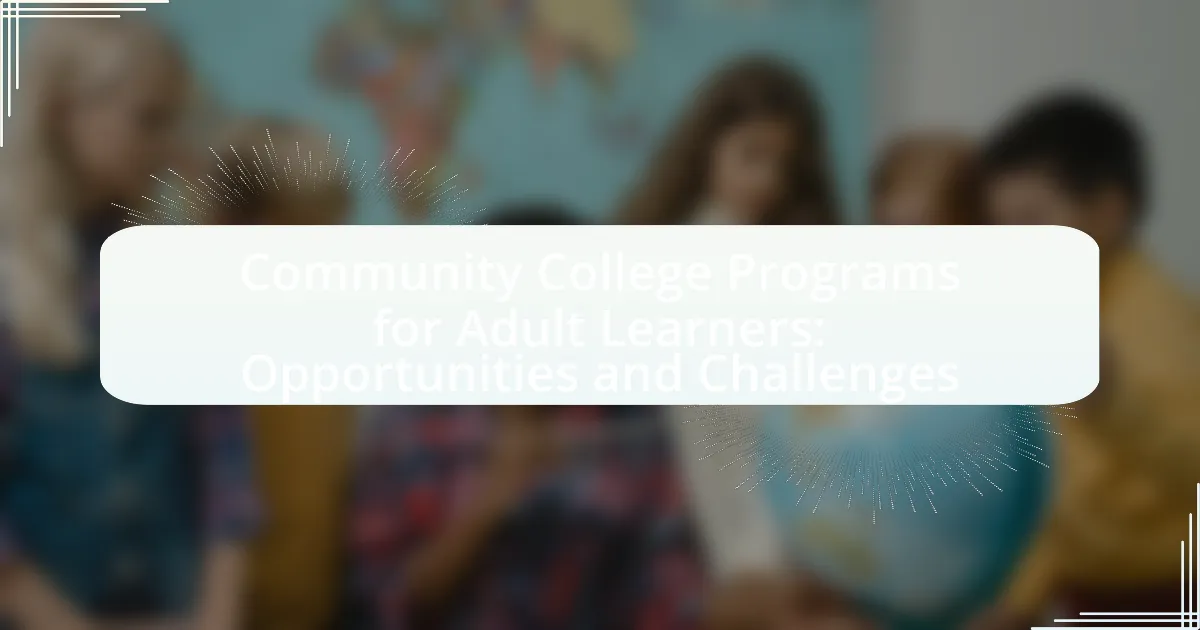Community college programs for adult learners are tailored educational offerings that address the specific needs of adults seeking to enhance their skills or further their education. These programs provide flexible scheduling, relevant curricula, and support services, accommodating the unique challenges faced by adult learners, such as balancing work and family responsibilities. The article explores how community colleges cater to adult learners through various degree and vocational training options, the benefits of enrolling in these programs, and the challenges that adult learners encounter, including financial constraints and time management issues. Additionally, it highlights the importance of support systems, goal-setting, and effective learning strategies in maximizing educational success for adult learners.

What are Community College Programs for Adult Learners?
Community college programs for adult learners are educational offerings designed to accommodate the unique needs of adults seeking to further their education or gain new skills. These programs often include flexible scheduling, online courses, and a variety of vocational training options, enabling adults to balance education with work and family responsibilities. According to the American Association of Community Colleges, over 40% of community college students are adults aged 25 and older, highlighting the significant role these institutions play in adult education.
How do these programs cater specifically to adult learners?
Community college programs cater specifically to adult learners by offering flexible scheduling, relevant curriculum, and support services tailored to their unique needs. These programs often provide evening and weekend classes, allowing adults to balance education with work and family commitments. Additionally, the curriculum is designed to align with current job market demands, ensuring that adult learners acquire skills that enhance their employability. Support services, such as academic advising and career counseling, are also available to assist adult learners in navigating their educational journey effectively.
What unique needs do adult learners have in education?
Adult learners have unique needs in education that include flexibility, relevance, and support. Flexibility is crucial as many adult learners balance education with work and family responsibilities, necessitating options like online courses and varied scheduling. Relevance is important because adult learners seek programs that align with their career goals and life experiences, enhancing motivation and engagement. Additionally, support services such as academic advising, tutoring, and career counseling are vital to help adult learners navigate challenges and succeed in their educational pursuits. These needs are underscored by research indicating that adult learners often face barriers such as time constraints and financial pressures, which educational institutions must address to facilitate their success.
How do community colleges address these needs?
Community colleges address the needs of adult learners by offering flexible scheduling, affordable tuition, and tailored programs that focus on workforce development. These institutions provide evening and weekend classes, online courses, and accelerated programs to accommodate the diverse schedules of adult students. According to the American Association of Community Colleges, 60% of community college students are over the age of 25, highlighting the demand for such flexible options. Additionally, community colleges often collaborate with local businesses to create programs that align with job market needs, ensuring that adult learners gain relevant skills for employment. This approach not only supports individual career advancement but also contributes to local economic development.
What types of programs are available for adult learners?
Adult learners have access to various programs, including degree programs, certificate programs, continuing education courses, and workforce development initiatives. Degree programs typically offer associate and bachelor’s degrees in fields such as business, healthcare, and technology, allowing adult learners to gain formal qualifications. Certificate programs focus on specific skills or knowledge areas, often designed to enhance employability or facilitate career changes. Continuing education courses provide opportunities for personal enrichment or professional development, covering a wide range of subjects. Workforce development initiatives aim to equip adult learners with the skills needed for in-demand jobs, often in collaboration with local employers. These programs are designed to meet the diverse needs of adult learners, accommodating their unique circumstances and goals.
What vocational training options do community colleges offer?
Community colleges offer a variety of vocational training options, including programs in healthcare, information technology, automotive technology, culinary arts, and skilled trades such as welding and plumbing. These programs are designed to provide students with practical skills and knowledge that align with industry demands. For instance, according to the American Association of Community Colleges, over 80% of community colleges offer programs that lead to certificates or degrees in high-demand fields, facilitating workforce readiness and career advancement for adult learners.
How do degree programs differ for adult learners compared to traditional students?
Degree programs for adult learners differ from those for traditional students primarily in their structure and delivery methods. Adult learners often require flexible scheduling, such as evening or online classes, to accommodate work and family responsibilities, while traditional students typically follow a more rigid, full-time schedule. Additionally, adult learners may benefit from programs that recognize prior learning and work experience, allowing for accelerated pathways to degree completion, unlike traditional students who usually follow a standard curriculum without such considerations. These differences are supported by research indicating that adult learners prioritize convenience and relevance in their education, as highlighted in studies by the American Council on Education, which emphasize the need for adaptable learning environments to meet the unique needs of adult students.
What are the benefits of enrolling in community college programs for adults?
Enrolling in community college programs for adults offers several benefits, including affordability, flexibility, and access to diverse educational opportunities. Community colleges typically have lower tuition rates compared to four-year institutions, making higher education more accessible; for instance, the average annual tuition for community colleges is about $3,500, compared to over $10,000 for public four-year colleges. Additionally, many community colleges provide flexible scheduling options, such as evening and online classes, which accommodate the busy lives of adult learners. Furthermore, these institutions often offer a wide range of programs, including vocational training and associate degrees, which can lead to immediate employment opportunities in high-demand fields.
How do these programs enhance career opportunities for adult learners?
Community college programs enhance career opportunities for adult learners by providing accessible education and skills training tailored to current job market demands. These programs often focus on high-demand fields such as healthcare, technology, and skilled trades, equipping learners with relevant qualifications. For instance, according to the American Association of Community Colleges, over 80% of community college graduates find employment within six months of completing their programs, demonstrating the effectiveness of these educational pathways in improving job prospects. Additionally, many community colleges offer flexible scheduling and online courses, allowing adult learners to balance education with work and family commitments, further increasing their employability.
What role does flexibility play in adult education at community colleges?
Flexibility is crucial in adult education at community colleges as it accommodates the diverse schedules and responsibilities of adult learners. Many adult students balance work, family, and education, making flexible course offerings, such as evening and online classes, essential for their success. According to the American Association of Community Colleges, over 40% of community college students are enrolled part-time, highlighting the need for adaptable learning environments that cater to varying availability. This flexibility not only enhances access to education but also improves retention rates, as students are more likely to persist in their studies when they can tailor their educational experience to fit their life circumstances.

What challenges do adult learners face in community college programs?
Adult learners face several challenges in community college programs, including time management, financial constraints, and balancing responsibilities. Time management is critical as many adult learners juggle work, family, and education, often leading to stress and burnout. Financial constraints are significant, with many adult learners relying on limited income or financial aid, which may not cover all expenses. Additionally, balancing responsibilities can create difficulties in maintaining consistent attendance and engagement in coursework. According to the National Center for Education Statistics, adult learners often report these challenges as barriers to their academic success, highlighting the need for tailored support services in community colleges.
How do financial constraints impact adult learners?
Financial constraints significantly hinder adult learners by limiting their access to educational resources and opportunities. Many adult learners face challenges such as tuition fees, textbook costs, and related expenses, which can deter them from enrolling in or completing community college programs. According to the National Center for Education Statistics, approximately 40% of adult learners cite financial issues as a primary barrier to their education. This financial strain often leads to increased stress and may result in part-time enrollment or dropping out altogether, ultimately affecting their career advancement and earning potential.
What financial aid options are available for adult learners?
Adult learners have access to several financial aid options, including federal grants, state grants, scholarships, and loans. Federal Pell Grants provide need-based financial assistance that does not require repayment, while state grants often support residents pursuing higher education. Scholarships, which can be merit-based or need-based, are offered by various organizations and institutions to help reduce educational costs. Additionally, federal student loans, such as Direct Subsidized and Unsubsidized Loans, allow adult learners to borrow funds for their education, with repayment options available after graduation. According to the National Center for Education Statistics, approximately 40% of adult learners utilize some form of financial aid to support their educational pursuits.
How can adult learners effectively manage education costs?
Adult learners can effectively manage education costs by utilizing financial aid options, budgeting, and exploring alternative learning pathways. Financial aid, including grants, scholarships, and low-interest loans, can significantly reduce out-of-pocket expenses; for instance, the Federal Pell Grant provides up to $6,495 for eligible students annually. Budgeting helps adult learners track their expenses and prioritize education-related costs, ensuring they allocate sufficient funds for tuition and materials. Additionally, exploring community college programs, which often offer lower tuition rates compared to four-year institutions, can further alleviate financial burdens. According to the American Association of Community Colleges, community colleges charge an average of $3,770 per year for in-district students, making them a cost-effective option for adult learners.
What time management issues do adult learners encounter?
Adult learners encounter several time management issues, primarily due to competing responsibilities such as work, family, and education. These competing demands often lead to difficulties in prioritizing tasks and allocating sufficient time for studying. Research indicates that 73% of adult learners report struggling to balance their educational commitments with personal and professional obligations, which can result in increased stress and decreased academic performance. Additionally, many adult learners lack effective time management strategies, making it challenging to create structured schedules that accommodate their diverse responsibilities.
How can adult learners balance education with work and family responsibilities?
Adult learners can balance education with work and family responsibilities by implementing effective time management strategies and utilizing flexible learning options. Prioritizing tasks through scheduling can help adult learners allocate specific times for studying, work, and family activities, ensuring that each area receives adequate attention. Research indicates that adult learners who engage in part-time or online courses often report higher satisfaction and lower stress levels, as these formats allow for greater flexibility in managing their commitments. Additionally, support systems such as family involvement and employer assistance programs can further enhance the ability to juggle these responsibilities, as they provide necessary resources and encouragement.
What resources are available to help adult learners with time management?
Adult learners can access various resources to improve their time management skills, including workshops, online courses, and time management tools. Community colleges often offer workshops specifically designed for adult learners, focusing on practical strategies for prioritizing tasks and setting goals. Online platforms like Coursera and Udemy provide courses on time management techniques, allowing learners to study at their own pace. Additionally, tools such as digital calendars, task management apps like Todoist, and the Pomodoro Technique can help adult learners organize their schedules effectively. These resources are widely recognized for enhancing productivity and helping individuals balance their educational pursuits with personal and professional responsibilities.
What social and emotional challenges do adult learners face?
Adult learners face significant social and emotional challenges, including balancing family responsibilities, managing time effectively, and overcoming feelings of isolation. These challenges are compounded by the need to adapt to a learning environment that may differ from their previous educational experiences. Research indicates that adult learners often struggle with self-doubt and anxiety, particularly when returning to school after a long absence, which can hinder their academic performance and engagement. Additionally, the lack of peer support and networking opportunities in community college settings can exacerbate feelings of loneliness and disconnection, making it essential for institutions to provide resources that foster a supportive community.
How can community colleges support adult learners’ mental health?
Community colleges can support adult learners’ mental health by providing accessible counseling services and mental health resources. These institutions often offer on-campus mental health professionals who can address the unique stressors faced by adult learners, such as balancing work, family, and education. Research indicates that community colleges with integrated mental health services see improved student retention and academic performance, as these resources help mitigate anxiety and depression among adult learners. Additionally, community colleges can create supportive environments through peer mentoring programs and workshops focused on stress management and resilience, further enhancing the mental well-being of their adult student population.
What role does peer support play in the success of adult learners?
Peer support significantly enhances the success of adult learners by fostering a collaborative learning environment. This support system encourages motivation, accountability, and the sharing of diverse perspectives, which are crucial for adult learners who often juggle multiple responsibilities. Research indicates that adult learners who engage in peer support networks experience higher retention rates and improved academic performance, as evidenced by a study published in the Journal of Adult Education, which found that 75% of participants reported increased confidence and engagement due to peer interactions. Thus, peer support plays a vital role in facilitating both personal and academic growth among adult learners.

How can adult learners maximize their success in community college programs?
Adult learners can maximize their success in community college programs by actively engaging in their education, utilizing available resources, and developing effective time management skills. Engaging in education includes attending classes regularly, participating in discussions, and seeking help from instructors when needed. Utilizing resources such as tutoring services, academic advising, and study groups can provide additional support and enhance understanding of course material. Effective time management skills, including creating a study schedule and prioritizing tasks, enable adult learners to balance their academic responsibilities with personal and professional commitments. Research indicates that students who actively participate and utilize support services are more likely to achieve higher academic performance and complete their programs successfully.
What strategies can adult learners use to stay motivated?
Adult learners can stay motivated by setting clear, achievable goals and creating a structured study schedule. Establishing specific objectives helps learners focus their efforts and measure progress, which is essential for maintaining motivation. Research indicates that goal-setting enhances self-efficacy and commitment, as demonstrated in a study published in the Journal of Educational Psychology, where students who set specific goals showed higher levels of motivation and academic performance. Additionally, forming study groups or seeking support from peers can foster a sense of community, further encouraging persistence and engagement in learning activities.
How can setting goals improve academic performance for adult learners?
Setting goals can significantly improve academic performance for adult learners by providing clear direction and motivation. When adult learners establish specific, measurable, achievable, relevant, and time-bound (SMART) goals, they enhance their focus and commitment to their studies. Research indicates that goal-setting leads to higher levels of self-efficacy, which is crucial for adult learners who may face unique challenges such as balancing education with work and family responsibilities. A study published in the Journal of Adult Education found that adult learners who set academic goals were 25% more likely to complete their courses compared to those who did not set goals. This demonstrates that goal-setting not only clarifies priorities but also fosters a sense of accountability, ultimately leading to improved academic outcomes.
What role does self-discipline play in achieving educational success?
Self-discipline is crucial for achieving educational success, particularly in community college programs for adult learners. It enables individuals to manage their time effectively, prioritize tasks, and maintain focus on their academic goals. Research indicates that students with higher self-discipline tend to achieve better grades and complete their programs more successfully. For instance, a study published in the Journal of Educational Psychology found that self-discipline is a stronger predictor of academic performance than IQ, highlighting its importance in educational settings. Thus, self-discipline directly influences the ability of adult learners to navigate the challenges of community college and attain their educational objectives.
What resources should adult learners utilize for academic support?
Adult learners should utilize academic support resources such as tutoring centers, academic advising, online learning platforms, library services, and study groups. Tutoring centers provide personalized assistance in various subjects, enhancing understanding and performance. Academic advising helps learners navigate course selections and career paths, ensuring they meet their educational goals. Online learning platforms offer flexible access to courses and materials, accommodating diverse schedules. Library services provide access to a wealth of academic resources, including books, journals, and research databases. Study groups foster collaboration and peer support, which can improve retention and comprehension of course material. These resources collectively enhance the academic experience for adult learners in community college programs.
How can tutoring services enhance learning outcomes for adult learners?
Tutoring services can enhance learning outcomes for adult learners by providing personalized instruction tailored to individual needs. This individualized approach allows adult learners to address specific gaps in knowledge, thereby improving comprehension and retention of material. Research indicates that personalized tutoring can lead to significant improvements in academic performance; for instance, a study published in the “Review of Educational Research” found that students receiving one-on-one tutoring scored, on average, 30 percentile points higher than their peers who did not receive such support. Additionally, tutoring services often incorporate flexible scheduling, which accommodates the busy lives of adult learners, further promoting engagement and success in their educational pursuits.
What online resources are available to assist adult learners in their studies?
Online resources available to assist adult learners in their studies include platforms such as Coursera, edX, and Khan Academy, which offer a wide range of courses across various subjects. These platforms provide access to high-quality educational materials, often created by top universities and institutions, enabling adult learners to study at their own pace. Additionally, websites like LinkedIn Learning and Udemy offer professional development courses tailored to adult learners seeking to enhance their skills for career advancement. Research indicates that online learning can significantly improve educational outcomes for adult learners, as it allows for flexible scheduling and personalized learning experiences.
What best practices can adult learners adopt for effective learning?
Adult learners can adopt several best practices for effective learning, including setting clear goals, engaging in active learning, and utilizing time management strategies. Setting clear goals helps learners focus their efforts and measure progress, which is supported by research indicating that goal-setting enhances motivation and achievement. Engaging in active learning, such as participating in discussions and hands-on activities, promotes deeper understanding and retention of information, as studies show that active involvement leads to better learning outcomes. Additionally, effective time management allows adult learners to balance their educational pursuits with personal and professional responsibilities, which is crucial given that many adult learners juggle multiple commitments.
How can adult learners create a conducive study environment?
Adult learners can create a conducive study environment by establishing a dedicated, organized space that minimizes distractions and promotes focus. This involves selecting a quiet area with adequate lighting, comfortable seating, and necessary study materials readily available. Research indicates that a well-structured environment enhances concentration and retention, as demonstrated in studies showing that students perform better in organized settings compared to cluttered ones. Additionally, incorporating elements such as a consistent study schedule and the use of technology tools for organization can further enhance the effectiveness of the study environment.
What techniques can improve retention and understanding of course material?
Active learning techniques, such as summarization, self-explanation, and teaching others, can significantly improve retention and understanding of course material. Research indicates that engaging with the material through these methods enhances cognitive processing, leading to better memory retention. For instance, a study by Fiorella and Mayer (2016) published in the Journal of Educational Psychology found that students who taught material to peers demonstrated higher retention rates compared to those who passively reviewed content. Additionally, spaced repetition, which involves revisiting material at increasing intervals, has been shown to strengthen memory retention, as supported by Ebbinghaus’s forgetting curve theory. These techniques are particularly effective in community college settings, where adult learners benefit from practical application and collaborative learning environments.

Leave a Reply